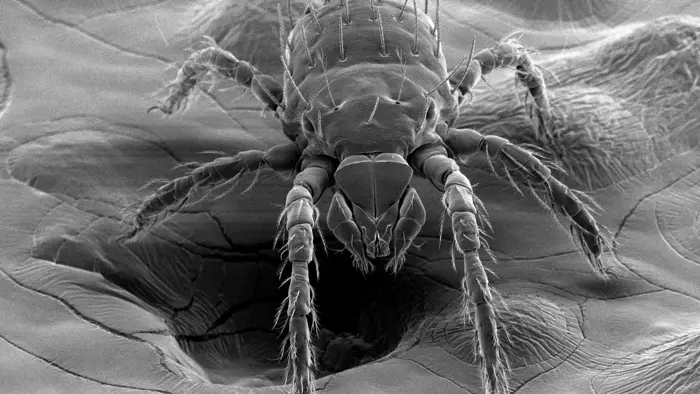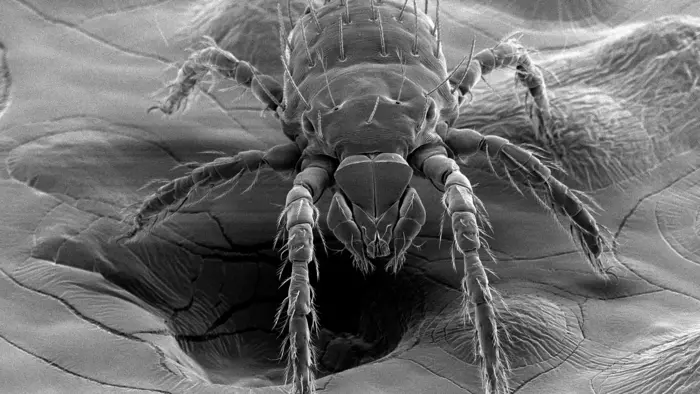July 12, 2023
Bacterium Associated With Disease Found in N.C. Chiggers

Credit: Loganathan Ponnusamy, NC State University
July 12, 2023
Bacterium Associated With Disease Found in N.C. Chiggers
EMBARGOED FOR RELEASE UNTIL NOON EDT ON WEDNESDAY, JULY 12
A bacterium that causes a disease called scrub typhus – a disease not previously reported in the United States – has been detected in North Carolina, according to a new study by researchers at North Carolina State University and UNC-Greensboro.
The researchers stress that scrub typhus, which can cause fever, headache and body aches – and can be fatal if left untreated by antibiotics – has not yet been detected in animals or people in the state.
The NC State researchers detected the bacterium – the genus is Orientia in the family Rickettsiaceae – at a high frequency while testing free living, larval (ready to bite) trombiculid mites, commonly called chiggers, in several different recreational parks in North Carolina.
“We wanted to see if chiggers in the United States carried Orientia,” said Loganathan Ponnusamy, an NC State principal research scholar in entomology and co-corresponding author of a paper that describes the research. “We haven’t in the past had the diagnostic tools to test for this specific bacterium at the genus level.”
“We set a black tile on the ground in 10 different North Carolina state parks and picked up chiggers as they crossed the tile. Microbiome studies allowed us to characterize all the bacteria in the chiggers. One park showed a 90% positivity rate for the bacterium (nine out of 10 chiggers captured); another showed an 80% positivity rate (eight of 10 chiggers captured). Other parks showed positivity rates of just 10%.”
Trombiculid mites are only parasitic in their larval stage. They search for vertebrate hosts – including humans – to bite, Ponnusamy says.
“Chiggers can spread bacteria to people or rodents when they bite but can also pass bacteria to future generations of mites through their eggs,” he added.
The researchers say that scrub typhus presents symptoms similar to those of Rocky Mountain spotted fever, a disease generally ascribed to tick bites.
Scrub typhus is found more commonly in Asia and the Pacific, but in recent years has been detected in Africa and the Middle East. It is uncertain whether spread is caused by people or goods carrying chiggers from one place to another.
“We don’t know if this is a recent introduction into the state or if the bacterium has been here for years,” said R. Michael Roe, William Neal Reynolds Distinguished Professor of Entomology at NC State and co-author of the paper. “We also don’t know if the infected chiggers found in North Carolina actually will cause disease; this has to be determined in future work.”
“We also don’t have information about whether the chigger infection rate is decreasing or increasing,” said Kaiying Chen, a postdoctoral research scholar at NC State and lead author of the paper.
The NC State and UNC-Greensboro researchers are resampling chiggers in the recreational park sites to see if the reported findings remain consistent.
The paper appears in the journal Emerging Infectious Diseases. Other co-authors include Nicholas V. Travanty and Charles S. Apperson from North Carolina State University; Reuben Garshong and Gideon Wasserberg from the University of North Carolina Greensboro; and Dac Crossley from the Georgia Museum of Natural History.
Funding was provided by a grant from the National Institutes of Health, National Institute of Allergy and Infectious Diseases (grant no. 1R03AI166406-01); a grant from the Southeast Center for Agricultural Health and Injury Prevention, and from the Department of the Army, U.S. Army Contracting Command, Aberdeen Proving Ground, Natick Contracting Division, Ft Detrick MD. Any opinions, findings, and conclusions or recommendations expressed in this material are those of the author(s) and do not necessarily reflect the position or the policy of the Government and no official endorsement should be inferred.
– kulikowski –
Note to editors: The abstract of the paper follows.
“Detection of Orientia Spp. Bacteria in Field-Collected Free-Living Eutrombicula Chigger Mites, USA”
Authors: Kaiying Chen, Nicholas V. Travanty, Charles S. Apperson, R. Michael Roe, and Loganathan Ponnusamy, North Carolina State University; Reuben Garshong and Gideon Wasserberg, University of North Carolina Greensboro; Dac Crossley, Georgia Museum of Natural History
Published: July 12, 2023 in Emerging Infectious Diseases
DOI: 10.3201/eid2908.230528
Abstract: Scrub typhus, a rickettsial disease caused by Orientia spp., is transmitted by infected larval trombiculid mites (chiggers). We report the molecular detection of Orientia species in free-living Eutrombicula chiggers collected in an area in North Carolina, United States, in which spotted fever group rickettsiae infections are endemic.
Journal
Emerging Infectious Diseases
DOI
10.3201/eid2908.230528
Method of Research
Observational study
Subject of Research
Animals
Article Title
Detection of Orientia Spp. Bacteria in Field-Collected Free-Living Eutrombicula Chigger Mites, USA
Article Publication Date
12-Jul-2023
COI Statement
None





